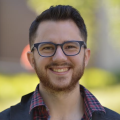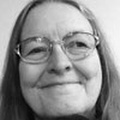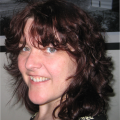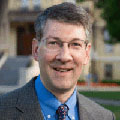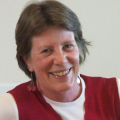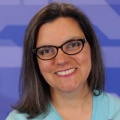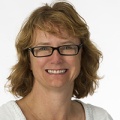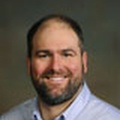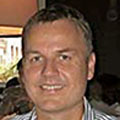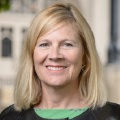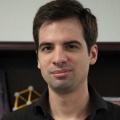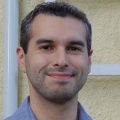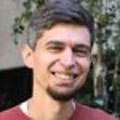PresQT Speakers
Steve Androulakis
Steve Androulakis in Community Platforms at Australia’s National eResearch Collaboration Tools and Resources (Nectar) has ten years of experience working in eResearch. Formerly a software developer in a structural biology lab, Steve has spent his time obsessed with accelerating research through better handling of data.
Margaret Berta
Margaret Berta is a sophomore undergraduate majoring in biochemistry and political science at the University of Notre Dame. She has been working in Dr. Marya Lieberman’s lab for four years to help develop pharmaceutical analytical devices (PADs) that provide rapid and cost-effective detection of substandard pharmaceuticals in developing countries. She currently coordinates the Distributed Pharmaceutical Analysis Lab (DPAL) which utilizes the analytical capabilities of academic institutions in the United States to test pharmaceutical samples from Kenya.
Jake Carlson
Jake Carlson is the Research Data Services Manager at the University of Michigan Library. In this role, he explores the application of the theories, principles, and practices of library science to data management and curation issues. In particular, Carlson seeks to increase the capabilities and opportunities for research libraries to provide services supporting data-related research. Carlson was a primary architect of the Data Curation Profiles Toolkit developed by Purdue and the University of Illinois at Urbana-Champaign (http://datacurationprofiles.org), and was the PI of the Data Information Literacy project (http://datainfolit.org). He is a co-editor, with Lisa Johnston, of the book Data information Literacy: Librarians, Data and the Education of a New Generation of Researchers published in 2015 by the Purdue University Press.
Euan Cochrane
Euan Cochrane brings a wealth of practical knowledge and experience on digital preservation developed from a diverse range of positions he has held including working on the establishment of the data archive for official statistics at Statistics New Zealand, working in the Digital Continuity team at Archives New Zealand and consulting for Deloitte in Australia on Information Management.In his current role as Digital Preservation Manager at Yale University Library, Euan established digital preservation services through Preservica and Emulation as a Service. He has a particular interest in software preservation and the use of emulation to maintain access to born digital content and is currently involved in grant funded work in both of these areas and is on the Governance group for the Software Preservation Network.
Ruth Duerr
Ruth Duerr has worked in Earth/Space, information and data sciences for many years. Duerr is passionate about encouraging researchers to become better data stewards. She has authored many publications on the management and curation of Earth science data. Duerr’s research interests include nearly all facets of science data management, digital archives, records management, digital library science, and software and system engineering. Duerr is very active in the Federation of Earth Science Partners (ESIP), serving on various committees and clusters, and has recently served as chair of the Data Stewardship Committee and sat on the Board of Directors of the Foundation for Earth Science as an elected ESIP Representative. Outside of ESIP, Duerr participates in and holds leadership positions in groups such as the Research Data Alliance (RDA) and the Earth and Space Science Informatics (ESSI) Focus Group of the American Geophysical Union (AGU). She is currently the President of that group and a member of the AGU Council. Duerr has taught data management at the University of Illinois at Urbana Champaign, and her passion for instruction is also demonstrated through her presentations at a variety of workshops, as well as her editing of ESIP’s peer-reviewed Data Management short course.
Ian Foster
Ian Foster is the Arthur Holly Compton Distinguished Service Professor of Computer Science at the University of Chicago and a Senior Scientist and Distinguished Fellow at Argonne National Laboratory. Originally from New Zealand, he has lived in Chicago for longer than he likes to admit. Ian has a long record of research contributions in high-performance computing, distributed systems, and data-driven discovery. He has also led US and international projects that have produced widely used software systems and scientific computing infrastructures. He has published hundreds of scientific papers and seven books on these and other topics. Ian is an elected fellow of the American Association for the Advancement of Science, the Association for Computing Machinery, and the British Computer Society. His awards include the British Computer Society's Lovelace Medal, the IEEE Tsutomu Kanai award, and honorary doctorates from CINVESTAV, Mexico, and the University of Canterbury, New Zealand.
Sandra Gesing
Sandra Gesing is a research assistant professor and computational scientist at the University of Notre Dame. Her research interests include science gateways, computational workflows as well as distributed and parallel computing under consideration of sustainability of applications and reproducibility of scientific research. In this context, she also works on the whole data lifecycle and preservation of modeling and simulations. She is ND’s PI for the Science Gateways Community Institute (SGCI) and co-PI of PresQT. Prior to the position at Notre Dame, she was a research associate in the Data-Intensive Research Group at the University of Edinburgh, UK, in the area of data-intensive workflows and in the Applied Bioinformatics Group at the University of Tübingen, Germany, in the area of science gateways and grid computing. Additionally, she has perennial experience as a project manager and system developer in industry. As head of a system programmer group, she has led long-term software projects (e.g. infrastructure on web-based applications). She received her German diploma in computer science from extramural studies at the FernUniversität Hagen and her PhD in computer science from the University of Tübingen, Germany.
Mike Hildreth
Mike Hildreth is the Associate Dean of Research and Graduate studies and Professor of Physics at University of Notre Dame. Hildreth is currently PI for the NSF Data and Software Preservation for Open Science NSF funded project and part of the CMS Offline Software management team and has served as convener of the CMS Simulation group. He served as convener of the Central Fiber Tracker and General Tracking groups, and spent two years as overall Offline Software Coordinator of the DØ experiment. He also serves on the NSF Advisory Committee on Cyber-Infrastructure. Hildreth was a senior fellow and guest scientist at Fermi National Laboratory and was scientific associate and physicist at CERN, the European Organization for Nuclear Research, in Geneva, Switzerland.
Nancy Hoebelheinrich
Nancy Hoebelheinrich, Knowledge Motifs is a digital library, archives and data repository consultant specializing in geospatial and cultural heritage resources. Nancy's recent clients have included the Foundation for Earth Science, California State Library, American Geophysical Union, California Historical Society, California Digital Library, Library of Congress, and Stanford University Libraries. Nancy has been active in a number of information and educational technology specification efforts including that of the ESIP Federation’s Data Stewardship Committee, and Semantic Web Cluster, METS (Metadata Encoding and Transmission Standard), PREMIS (for preservation metadata), IMS Global specifications related to packaging, repository and resource list interoperability, digital rights expression and management, and the IEEE Learning Technology Standards Committee's RAMLET project. Prior to founding Knowledge Motifs LLC, Nancy worked in school, public, academic research and law libraries including, most recently, Stanford University Libraries where she focused upon digitization, preservation, retrieval and data management of cultural heritage resources, government documents, geospatial data, and teaching / learning resources. She has a Master’s degree in Library and Information Sciences from the University of Washington, an undergraduate degree in a self-designed major in Social Sciences & Humanities from Stanford University, and an advanced career certificate in GIS from Foothill College in Los Altos, CA.
Rick Johnson
Rick Johnson is Co-Program Director, Digital Initiatives and Scholarship at the University of Notre Dame. Johnson directs the design and development of the Libraries' data curation and digital library solutions for research, teaching, and learning. These include CurateND, the library’s service to curate, preserve, and spotlight collections and research at Notre Dame. Rick also provides oversight of data management planning services within the libraries, and supports activities in the Center for Digital Scholarship. With over 15 years experience, Rick has worked in software development, testing, sales, and management. In addition, Rick currently serves as a Visiting Program Officer for SHARE with the Association of Research Libraries. Rick has contributed to several collaborations such as DASPOS (Data and Software Preservation for Open Science). Over the years, he has been active in the multi-institutional Hydra collaboration as both a code committer and technical manager on several digital repository related projects.
Jaye Lapachet
Jaye A. H. Lapachet is a professional librarian and detail-oriented content manager experienced working in a variety of organizational settings requiring strong creative problem solving, technical and interpersonal skills. Ms. Lapachet sets up databases and workflow systems in libraries and is an expert at identifying ways to streamline workflow. These projects include a variety of database projects, technology implementation, training programs and department reorganizations. She assesses and uses technology solutions to solve information related issues, liaise across departments to build consensus and provide support for projects and training. Specialties: Systems analysis, workflow analysis, idea generation, out of the box thinking to generate solutions, information asset identification, writing, metadata application, project planning & implementation and idea generation. Ms. Lapachet's strength is asymmetrical thinking and idea generation. She feels that the identification of information assets, followed by the organization and reuse of those information assets is critical to the ongoing success of an organization as whole.
Elliot Metsger
Elliot Metsger is a Senior Software Engineer at the Digital Research and Curation Center, Sheridan Libraries, Johns Hopkins University. He develops software for the Data Conservancy, an organization dedicated to digital archiving and preservation, and is active in the Fedora community. His current work focuses on digital packaging as an enabler of curation and provenance activities.
Natalie Meyers
Natalie K. Meyers is COS Labs Partnerships and Project Manager at the Center for Open Science (cos.io) during a part-time leave from her faculty role as an E-Research librarian at the University of Notre Dame. At COS, Natalie works with on research projects and with software developers and platform providers to facilitate integrations that connect research information and researchers’ tools. At her university, she devotes a significant part of her time as an embedded data librarian and has served as a member of senior personnel for the USA’s NSF funded Data and Software Preservation for Open Science (daspos.org ) project, as digital librarian for the Bill and Melinda Gates Foundation VecNet project, and is co-PI on the PresQT project. Natalie helps pioneer and provide research data consulting services, including more in-depth data management services in support of grant-funded research and works to address needs for preserving data and software.
Pierre Montagano
Pierre Montagano is the Business Development Director for Code Ocean, a Cornell Tech incubated startup. He has over 20 years experience in publishing but recently left to work with researchers in developing an executable code repository that helps helps facilitate reproducibility and reuse of scientific code.
Jarek Nabrzyski
Jarek Nabrzyski is Director of the Center of Research Computing at the University of Notre Dame, and a co-PI on several NSF and NIH related awards. The EarthCube Research Coordination Network for High-Performance Distributed Computing in the Polar Sciences supports advances in computing tools and techniques that will enable the Polar Sciences Community to address significant challenges, both in the short and long-term. Nabrzyski is a co-PI (with M. Hildreth as the PI) on the NSF award to organize a series of workshops to gauge community requirements for public access to data from NSF-Funded Research. In DASPOS Nabrzyski and his team develop container-based architectures for preserving data and software to the point where the repetition of analysis using only the archived data, software, and analysis description is possible. Nabrzyski is also the PI on a BlueWaters allocation award “Strategies for Topology and Application Aware Job Resource Management in 3D Torus-based Blue Waters System” and co-PI on an NIH award: VectorBase: A Bioinformatics Resource Center for Invertebrate Vectors of Human Pathogens.
Line Pouchard
Line Pouchard joined the Center for Data-Driven Discovery in the Computational Science Initiative Directorate at Brookhaven National Laboratory as Senior Researcher in January 2017. She is an information scientist who led multiple efforts improving scientific data discovery for scientific domains of interest to the Department of Energy, including high performance computing, earth sciences, and national security. Her research focuses on aspects of provenance, Semantic Web technologies and text mining techniques. Before joining BNL, Line was Assistant Professor at Purdue University where she led the investigation of the big data landscape for the Libraries. Prior to this, Line spent 15 years at Oak Ridge National Laboratory. She has a PhD from the Graduate Center of the City University of New York, and an MS from the University of Tennessee, Knoxville. Outside work she can be found on a trail or under water practicing her favorite sports.
Rémi Rampin
Rémi Rampin is a Research Engineer at NYU's Center for Data Science, where he has been maintaining VisTrails, a scientific workflow and provenance management system, and developing ReproZip, a software for creating reproducible packages of research and computational environments. Rémi earned a Master of Science in Engineering and a Master of Science in Computer Information Systems from Supélec in Paris.
Fernando Rios
Fernando Rios is currently a CLIR postdoctoral fellow in the Data Management Services group at Johns Hopkins University, investigating issues around archiving software and code to support research reproducibility and reuse. At Johns Hopkins, Rios has been active in software development in academia and in industry where he’s worked on projects in the areas of geographic information systems (GIS), groundwater modeling, and incident management. Rios’ recent interests include research on software preservation, managing scholarly research, scientific communication, and advocacy for reproducible computing. Rios received his Ph.D. in Geography from the University at Buffalo, SUNY and my BS and MS in computational science from the University of Waterloo and Florida State University respectively.
Jeffrey Spies
Jeffrey Spies is the co-founder and Chief Technology Officer (CTO) of the Center for Open Science (COS), a non-profit technology company missioned to increase openness, integrity, and reproducibility of scholarly research. COS was launched in 2013 with a $5.25M grant from the Laura and John Arnold Foundation and has since raised over $21M in additional funding. As CTO, Jeff is responsible for technical strategy, product vision, software architecture, external partner/funder development, and management of COS Labs—COS's research and development team. He is also the co-director of SHARE, a partnership with the Association of Research Libraries to create a free, open data set of scholarly research activity across the research life-cycle. Jeff holds a Visiting Assistant Professor position in the Department of Engineering and Society at the University of Virginia’s School of Engineering and Applied Science. Jeff was recently named an Association for Psychological Science Rising Star whose “work has already advanced the field and signals great potential for continued contributions.” Jeff is regularly invited to speak on topics of openness, reproducibility, workflow, and the role of technology in scholarship. Jeff recently testified on these topics at a United States House congressional hearing. Jeff completed his undergraduate work at the University of Notre Dame, where he also earned his Masters while in a joint program in Psychology and Computer Science. He went on to receive his Ph.D. in Quantitative Psychology from the University of Virginia. His dissertation included the development of the Open Science Framework--a free, open source workflow management system and scholarly commons that is now the flagship product of COS.
Vicky Steeves
Vicky Steeves is the Librarian for Research Data Management and Reproducibility at New York University, a dual appointment between the Division of Libraries and Center for Data Science. In this role, she works supporting researchers in creating well-managed, high quality, and reproducible research through facilitating use of tools such as ReproZip. Her research centers on integrating reproducible practices into the research workflow, advocating openness in all facets of scholarship, and building/contributing to open infrastructure.
Ian Taylor
Ian Taylor is a research professor at Notre Dame, and a Reader in Cardiff University, UK. He also consults often to the Naval Research Lab (NRL) and has led the IT development and infrastructures for several startups and redevelopment projects for existing businesses. Ian has a degree in Computing Science and a Ph.D. researching and implementing artificial-neural- network types for the determination of musical pitch. After his Ph.D, he joined the gravitational-wave group at Cardiff where he designed, procured and engineered the implementation of the data acquisition system for the GEO 600 gravitational wave detector. He also wrote the Triana workflow system and managed it thereafter. Ian's research over the last 25 years has covered a broad range of distributed computing areas but he now specializes in Web interaction and APIs, big data applications, open data access, distributed scientific workflows and data distribution, with application areas ranging from audio, astrophysics and engineering to bioinformatics and healthcare. He has managed over 15 research and industrial projects, published over 150 papers, 3 books, acted as guest editor for several special issues in journals and chairs the WORKS Workflow workshop yearly at Supercomputing. Ian has won the Naval Research Lab best research paper (ALAN Berman) prize in 2010, 2011 and 2015.
Ben Tovar
Ben Tovar is a research software engineer at the Cooperative Computing Lab, at the University of Notre Dame. In his current role, he is the lead maintainer of CCTools, a suite of tools to quickly enable scientist the use distributed, high-throughput computing. Prior to his position at Notre Dame, he was a Post-doctoral fellow in the area of control engineering in robotics at Northwestern University, and he received a Ph.D. in Computer Science from the University of Illinois Urbana-Champaign, where he studied mathematical modeling for robotics.
Zach Vowell
Zach Vowell is the Digital Archivist at the Robert E. Kennedy Library, California Polytechnic State University, San Luis Obispo. Since receiving his M.S.I.S. from the University of Texas at Austin in 2006, he has worked on a variety of digital projects, all of which have emphasized the close relationship between digital objects and the software that creates them. Besides his work as Software Preservation Network Co-PI, or with digitization and born-digital archiving, Zach's professional interests include digital repository infrastructure development, alternative description and access methods for archives, and archives as data.
John Wang
John Wang, Associate University Librarian, Digital Access, Resources and Information Technology at University of Notre Dame is a librarian and a technologist. His professional aspiration is to seamlessly integrate library experience for users both at online and physical spaces. He published and lectured in the areas of web services, web systems, web analytics, and digital assets management. John oversees three programs, Information Technology and Discovery Services, Resource Acquisitions and Delivery Services, and Digital initiatives and Scholarship. He provides leadership and guidance and manages vision and strategies in the development and optimization of library core systems, and digital, technical, and delivery services.
Shahar Zaks
Shahar Zaks is Director of Product at Code Ocean, a Cornell Tech incubated startup. He is a UX designer, creative technologist, and software developer; he holds a Master's degree from the Interactive Telecommunications Program (ITP) at New York University, and a B.Sc. in Neuroscience from the Hebrew University in Jerusalem.
